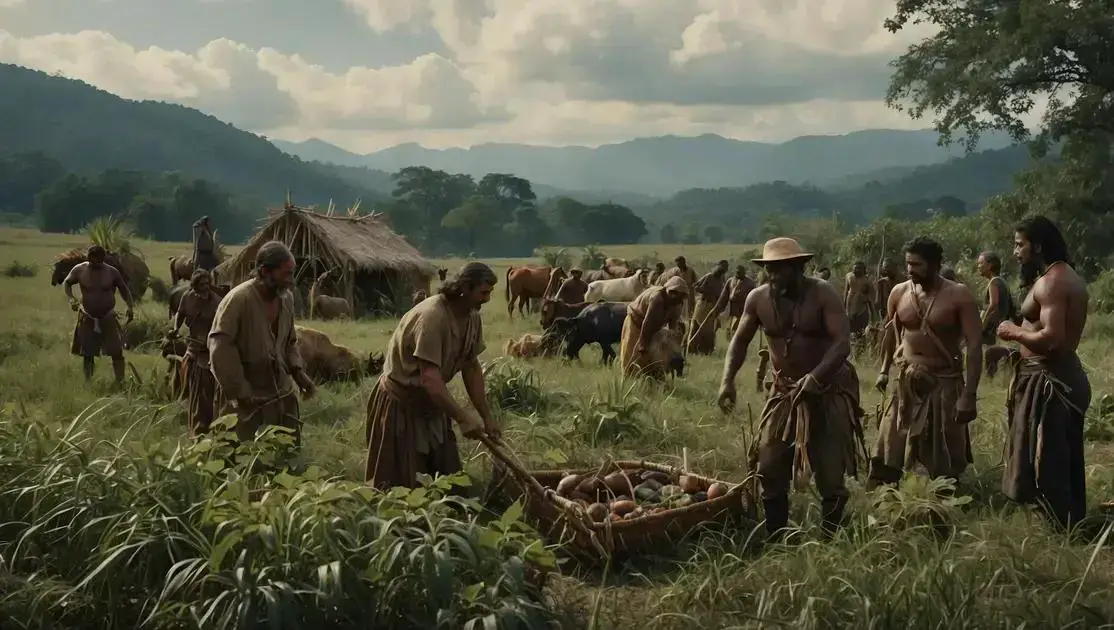Community Workshops are transforming neighborhoods into vibrant hubs of creativity and collaboration. These gatherings unite individuals of all backgrounds to share skills, foster innovation, and strengthen ties within the community. In this article, we’ll explore the various types of workshops available, their benefits, and how you can get involved to enrich your local area.
Table of Contents
ToggleUnderstanding Community Workshops
Understanding Community Workshops is critical for anyone looking to engage with their local neighbors and collaborate on shared interests. These gatherings serve as a platform for individuals to come together, share knowledge, and build skills that can benefit the entire community.
What are Community Workshops?
Community workshops are events that focus on skill-building and knowledge-sharing among community members. They often address specific topics, such as sustainability, health, or arts, and welcome participants of all ages and backgrounds. The goal is to create a space where individuals can learn from each other, enhance personal capabilities, and encourage collective preparedness in facing challenges, such as those posed by solar events.
Types of Workshops
Workshops can vary widely in focus and format. Some might be hands-on and practical, like DIY solar panel installations, while others may be discussion-based, focusing on planning and preparation strategies. Regardless of the format, each workshop aims for active participation and engagement.
Who Can Participate?
Anyone can join community workshops! They are especially valuable for residents interested in improving their neighborhoods and learning from one another. Whether you’re a student, a working professional, or a retiree, your insights can add value to the discussions and activities.
How They Foster Local Engagement
Community workshops not only enhance individual skills but also build social connections. Participating in these events leads to better networking opportunities, which can strengthen community bonds and facilitate collaboration on future local projects.
The Benefits of Participating in Community Workshops
The Benefits of Participating in Community Workshops are numerous and impactful. These events not only enhance personal skills but also foster a sense of belonging and collective action in the community.
Skill Development
Attending community workshops allows participants to learn new skills and techniques. Workshops often cover practical topics like solar energy applications, emergency preparedness, or environmental sustainability. This practical knowledge can empower individuals to take action in their own lives and communities.
Networking Opportunities
Workshops provide a space for individuals to meet like-minded people. By engaging with others, participants can exchange ideas, share experiences, and develop connections that may lead to future collaborations.
Community Engagement
Participating in workshops promotes active participation in local issues. When community members come together to learn and discuss, they cultivate a sense of ownership and responsibility for their surroundings, enhancing overall community well-being.
Empowerment and Confidence
Gaining new skills and participating actively can boost personal confidence. Individuals often leave workshops feeling empowered to apply what they have learned, whether it be through solar initiatives or local projects.
Access to Resources
Community workshops often provide access to resources, expert insights, and valuable materials. Participants can learn about various programs, grants, or tools available to help them implement new ideas and solutions in their neighborhoods.
How to Organize a Successful Community Workshop
How to Organize a Successful Community Workshop involves careful planning and execution. Here’s a step-by-step guide to help you set up a productive event.
Define the Purpose
Start by identifying the main goal of the workshop. Are you focusing on solar energy solutions, emergency preparedness, or community skills? Clearly defining the purpose will guide all other planning decisions.
Select a Venue
Choose a location that is accessible and large enough for your expected participants. Community centers, schools, or parks can be great options. Make sure the venue has necessary facilities like restrooms, seating, and AV equipment.
Create an Agenda
Outline the agenda for the workshop. Include time for presentations, hands-on activities, and Q&A sessions. A well-structured agenda helps keep participants engaged and informed throughout the event.
Gather Resources and Materials
Identify what materials you need, such as handouts, tools, or equipment. Gather resources in advance to avoid last-minute issues. If necessary, reach out to local organizations for support or sponsorship.
Promote the Workshop
Spread the word about your event using flyers, social media, and community boards. Make sure to highlight key benefits and what participants will gain from attending.
Involve Local Experts
Consider inviting local experts or speakers who can provide valuable insights or lead discussions. Their involvement may attract more participants and enhance the workshop’s credibility.
Engage Participants
Encourage active participation during the workshop. Use interactive activities, group discussions, and hands-on demonstrations to make learning engaging and fun.
Gather Feedback
At the end of the workshop, provide a way for participants to give feedback. This information is crucial for improving future events and understanding community needs better.
Key Topics Covered in Community Workshops
Key Topics Covered in Community Workshops are diverse and aim to address both immediate community needs and broader social issues. Here are some common themes:
Solar Energy Solutions
Workshops often focus on solar energy, teaching participants how to harness and utilize solar power. This includes understanding solar panel installation, maintenance, and potential savings on energy bills.
Emergency Preparedness
Another key topic is preparing for emergencies, from natural disasters to power outages. Participants can learn practical skills such as creating emergency kits, developing communication plans, and knowing evacuation routes.
Sustainability Practices
Community workshops frequently cover sustainability and environmental conservation. This may include sessions on recycling, composting, water conservation, and reducing carbon footprints.
Community Health and Wellness
Health-related topics are also prevalent. Workshops may provide information on nutrition, exercise, mental health awareness, and disease prevention. These sessions aim to empower individuals to make healthier lifestyle choices.
Local Governance and Civic Engagement
Participants can learn about local government, civic duties, and how to engage in community decision-making processes. Understanding local policies can encourage active participation in community improvement efforts.
Skill Building and Job Readiness
Workshops may also focus on building specific job skills, such as resume writing, interview techniques, and vocational training. These sessions are designed to enhance participants’ employability and career prospects.
Arts and Culture
Some workshops explore the arts and cultural heritage of a community. These include creative classes such as painting, crafting, music, and cultural events that celebrate local traditions.
Finding Community Workshops Near You
Finding Community Workshops Near You can enhance your connection to your neighborhood and provide valuable learning opportunities. Here are some effective ways to locate workshops in your area.
Online Resources
Start by searching online. Websites like Eventbrite, Meetup, and Facebook Events often list community workshops. These platforms allow you to filter by location, date, and topic, making it easy to find workshops that interest you.
Local Community Centers
Visit your local community centers or libraries, as they usually host various workshops. Check their bulletin boards or websites for upcoming events that cater to local needs.
Social Media Groups
Join local social media groups on platforms like Facebook or Instagram. These groups often share information about workshops, allowing you to connect with like-minded individuals and keep up with community happenings.
Community Flyers and Newsletters
Look for flyers posted in public spaces such as coffee shops, grocery stores, and schools. Community newsletters can also provide updates on workshops and other local activities.
Attend Local Events
Participate in local fairs, festivals, or markets where businesses and organizations promote their services. Networking at these events can help you discover new workshop opportunities.
Word of Mouth
Talk to friends, family, and neighbors. They may know of upcoming workshops or be interested in joining you for one. Personal recommendations can lead to valuable experiences.
Tips for Engaging More Participants
Tips for Engaging More Participants in community workshops can make a big difference in their success. Here are some effective strategies:
Leverage Social Media
Use platforms like Facebook, Instagram, and Twitter to promote your workshops. Create engaging posts, share event pages, and encourage participants to spread the word.
Offer Incentives
Consider providing incentives for participation, such as giveaways, refreshments, or certificates of completion. These small perks can encourage more people to join.
Build a Community Before the Event
Foster a sense of community by connecting with potential participants before the workshop. Host pre-event meetups or online discussions to generate interest and excitement.
Make the Workshop Interactive
Design the workshop to be hands-on and engaging. Interactive activities, small group discussions, and collaborative projects help participants feel involved and valued.
Target Specific Audiences
Identify and tailor workshops to specific groups within the community. For example, craft workshops for families or tech workshops for seniors can attract targeted participants.
Follow Up After Events
Maintain engagement even after the workshop ends. Send follow-up emails thanking participants, sharing resources, or promoting future events. This helps build long-term relationships.
Gather and Use Feedback
Collect feedback through surveys to understand what participants enjoyed and what could be improved. Use this information to enhance future workshops and address community needs better.
Success Stories from Community Workshops
Success Stories from Community Workshops highlight the positive impact these events can have on individuals and communities. Here are some inspiring examples:
Solar Installation Training
In a local community workshop focused on solar power, participants learned how to install solar panels. After training, several attendees successfully installed solar systems on their homes. This not only reduced energy costs but also increased awareness of renewable energy in the community.
Emergency Preparedness Drills
A series of workshops on emergency preparedness taught community members how to respond during natural disasters. One year later, when a storm hit the area, residents reported feeling more confident and organized, demonstrating the effectiveness of the training.
Health and Wellness Workshops
A health-focused workshop offered cooking classes and fitness sessions, helping participants adopt healthier lifestyles. Many attendees lost weight and improved their overall well-being, showcasing the power of community support in achieving personal health goals.
Youth Empowerment Programs
A workshop designed for teenagers featured leadership and team-building activities. Participants went on to organize a community event, demonstrating increased self-confidence and leadership skills that benefited their peers.
Environmental Clean-Up Initiatives
Workshops centered on environmental awareness inspired a community clean-up effort. Volunteers came together to remove litter and plant trees, fostering a sense of pride and responsibility for their local environment.
The Future of Community Workshops
The Future of Community Workshops looks promising as communities continue to evolve and adapt. Here are some anticipated trends and developments:
Increased Use of Technology
Technology will play a larger role in community workshops. Virtual meetings and online workshops are likely to become more common, allowing greater flexibility and reaching a wider audience. This can include using social media for live events and webinars.
Focus on Sustainability
Future workshops will likely emphasize sustainability, teaching participants eco-friendly practices and renewable energy solutions. Communities will need to address climate change challenges, and workshops can help equip residents with the necessary skills.
Enhanced Collaboration with Local Organizations
Community workshops will increasingly partner with local organizations, schools, and businesses. These collaborations can provide resources, expertise, and a larger platform for promotion, making workshops more impactful.
Tailored Programs for Diverse Audiences
As community demographics shift, workshops will become more tailored to meet the needs of different groups, such as youth, seniors, and cultural communities. This personalization will help ensure relevant content that resonates with participants.
Emphasis on Mental Health and Well-being
There will also be a growing focus on mental health and well-being in community workshops. Topics may include stress management, mindfulness, and resilience, addressing community needs in an increasingly challenging world.
Evaluation and Feedback Mechanisms
Future workshops will prioritize gathering participant feedback and evaluating effectiveness. Organizations will use surveys and assessments to improve content, ensuring workshops remain relevant and beneficial.
Essential Resources for Workshop Organizers
Essential Resources for Workshop Organizers provide the support needed to run effective community workshops. Here are some key resources you might consider:
Online Platforms
Utilize online platforms like Eventbrite or Meetup for scheduling and promoting your workshops. These tools help you manage registrations and reach a larger audience.
Community Centers and Libraries
Local community centers and libraries can be great venues for workshops. They often have space available for community use and may provide equipment, like projectors, tables, and chairs.
Instructional Materials
Prepare materials such as handouts, guides, and worksheets ahead of time. Websites like Canva offer templates that you can customize for your workshop’s branding and information.
Collaboration Tools
Use collaboration tools like Google Docs or Trello for planning and organizing the workshop. These tools allow you to collaborate with other organizers and get feedback in real time.
Local Experts
Reach out to local experts or organizations that can offer knowledge and resources related to your workshop topics. Their involvement can add credibility and attract more participants.
Feedback Mechanisms
Implement feedback forms to gather insights from attendees. Tools like SurveyMonkey can help you create quick surveys to evaluate the effectiveness of your workshop.
Marketing Resources
Utilize social media and community bulletin boards to promote your workshop. Also consider creating flyers or posters to distribute in local businesses and schools.
Measuring the Impact of Community Workshops
Measuring the Impact of Community Workshops is essential for understanding their effectiveness and improving future events. Here are some methods to evaluate their success:
Participant Feedback
Gathering feedback through surveys at the end of the workshop can provide valuable insights. Use simple questions to assess what participants learned, their satisfaction, and areas for improvement.
Pre-and Post-Assessment
Conduct pre-and post-assessments to measure knowledge gain. Ask participants to fill out a quiz or questionnaire before the workshop and then again afterward to see how much they have learned.
Engagement Levels
Observe participants’ engagement during the workshop. Take note of attendance numbers, participation in discussions, and completion of activities. High engagement often indicates a successful workshop.
Long-term Outcomes
Follow up with participants after a few months to see how they applied what they learned. This can help determine if the workshop made a lasting impact on their skills or community involvement.
Community Feedback
Get feedback from community leaders or organizations involved in the workshop. Their perspectives on the workshop’s impact can provide additional context and value to the evaluation.
Social Media and Online Metrics
Monitor social media engagement related to the workshop. Likes, shares, and comments can indicate interest and the overall reach of the opportunity.
In Conclusion: The Power of Community Workshops
Community workshops serve as a vital platform for fostering local engagement, skills development, and preparedness in times of need, especially regarding issues like solar events.
By understanding key topics, organizing effectively, and measuring impact, communities can create successful workshops that truly benefit participants and their neighborhoods.
As we look to the future, embracing technology, focusing on sustainability, and tailoring content for diverse audiences will ensure these workshops continue to thrive.
Engaging with community members, sharing success stories, and utilizing essential resources will help organizers strengthen connections and enhance the overall impact of their efforts.
Ultimately, when communities come together through workshops, they become better prepared, more knowledgeable, and empowered to take on challenges collectively.
FAQ – Frequently Asked Questions about Community Workshops
What are community workshops?
Community workshops are events that bring people together to learn, share skills, and engage with local issues, fostering collaboration and innovation.
How can I find community workshops near me?
You can find local workshops by checking online platforms like Eventbrite and Meetup, visiting community centers, and following local social media groups.
What topics are typically covered in community workshops?
Topics vary widely but can include solar energy, emergency preparedness, health and wellness, sustainability practices, and skill-building sessions.
How do I engage more participants in my workshop?
You can engage more participants by promoting workshops on social media, offering incentives, creating interactive activities, and targeting specific audiences.
How do I measure the impact of my community workshop?
Impact can be measured through participant feedback, pre-and post-assessments, observation of engagement levels, and tracking long-term outcomes.
What resources can help me organize a successful workshop?
Essential resources include online platforms for registration, instructional materials, community spaces for hosting, and local experts for additional guidance.











